LSC UoS BA: AI Impact on Business Strategy & People Management in 21st
VerifiedAdded on 2023/06/09
|7
|2032
|197
Essay
AI Summary
This essay examines the transformative impact of Artificial Intelligence (AI) on business strategy and people management in the 21st century. It highlights AI's role in controlling business operations, understanding customer behavior, and managing data usage, particularly in the context of remote working and service delivery. The report also emphasizes the importance of change management, learning, and talent acquisition to ensure organizations can adapt to AI-driven changes and maintain a competitive edge. It concludes that AI is essential for modern businesses, necessitating a focus on continuous learning and effective change management strategies to leverage AI's benefits and mitigate its risks.
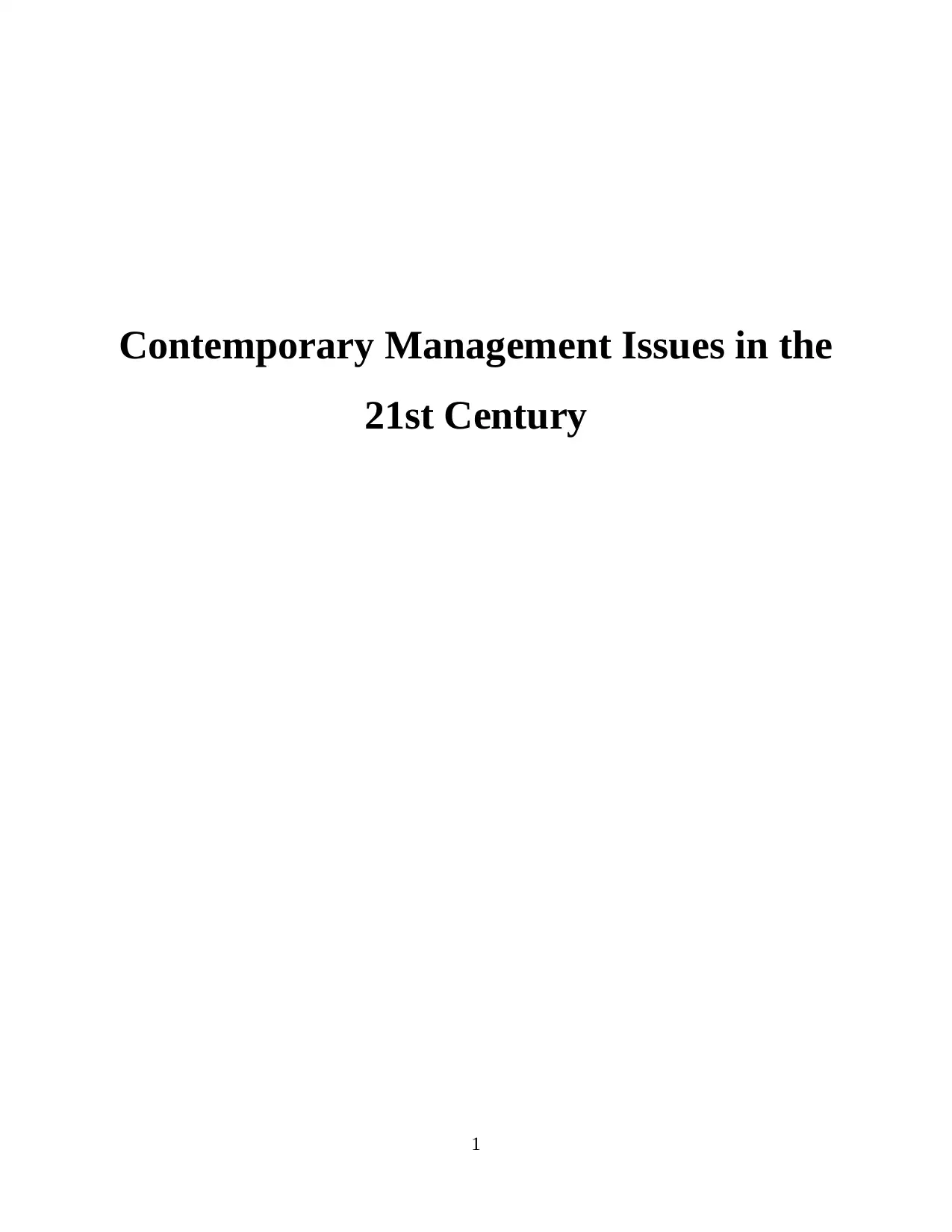
Contemporary Management Issues in the
21st Century
1
21st Century
1
Paraphrase This Document
Need a fresh take? Get an instant paraphrase of this document with our AI Paraphraser
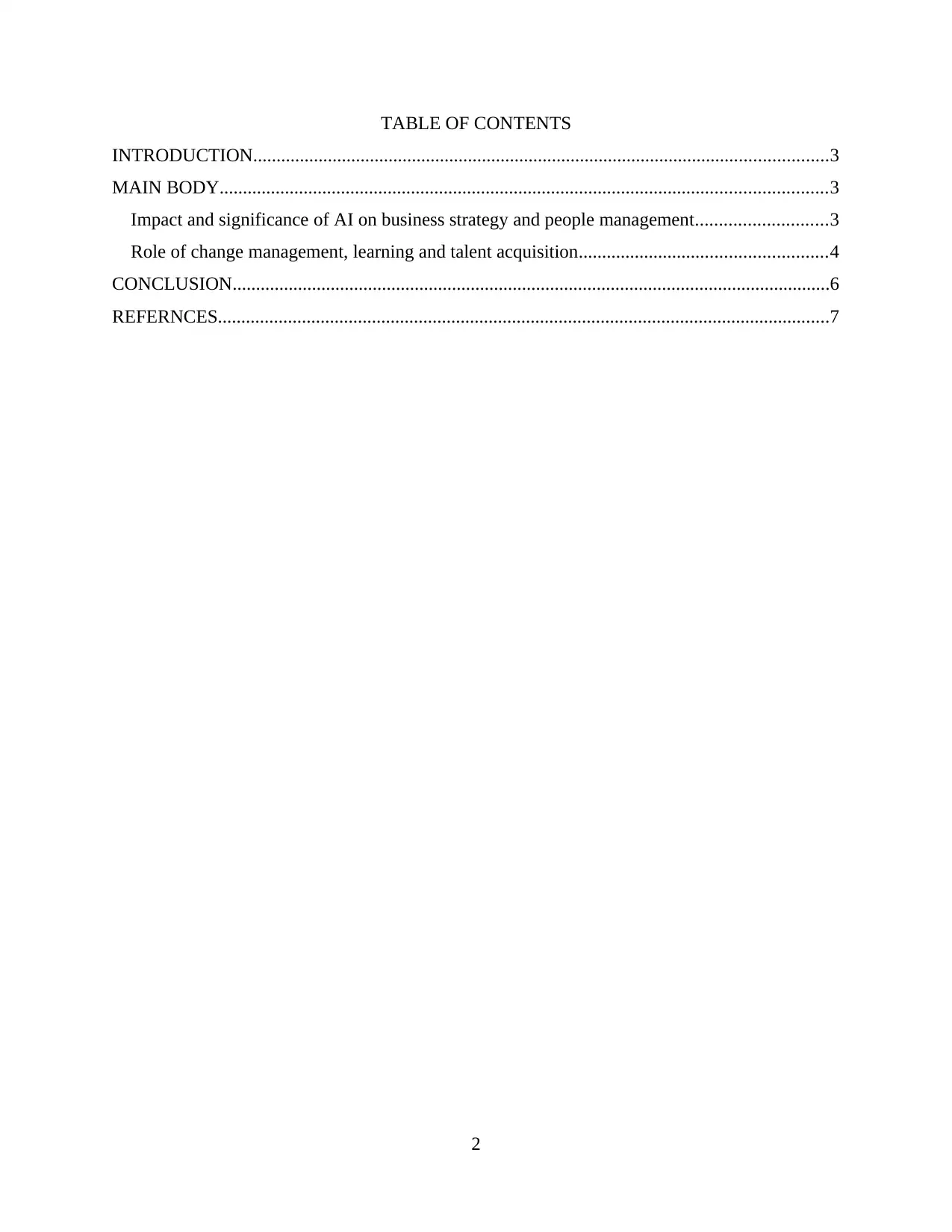
TABLE OF CONTENTS
INTRODUCTION...........................................................................................................................3
MAIN BODY..................................................................................................................................3
Impact and significance of AI on business strategy and people management............................3
Role of change management, learning and talent acquisition.....................................................4
CONCLUSION................................................................................................................................6
REFERNCES...................................................................................................................................7
2
INTRODUCTION...........................................................................................................................3
MAIN BODY..................................................................................................................................3
Impact and significance of AI on business strategy and people management............................3
Role of change management, learning and talent acquisition.....................................................4
CONCLUSION................................................................................................................................6
REFERNCES...................................................................................................................................7
2
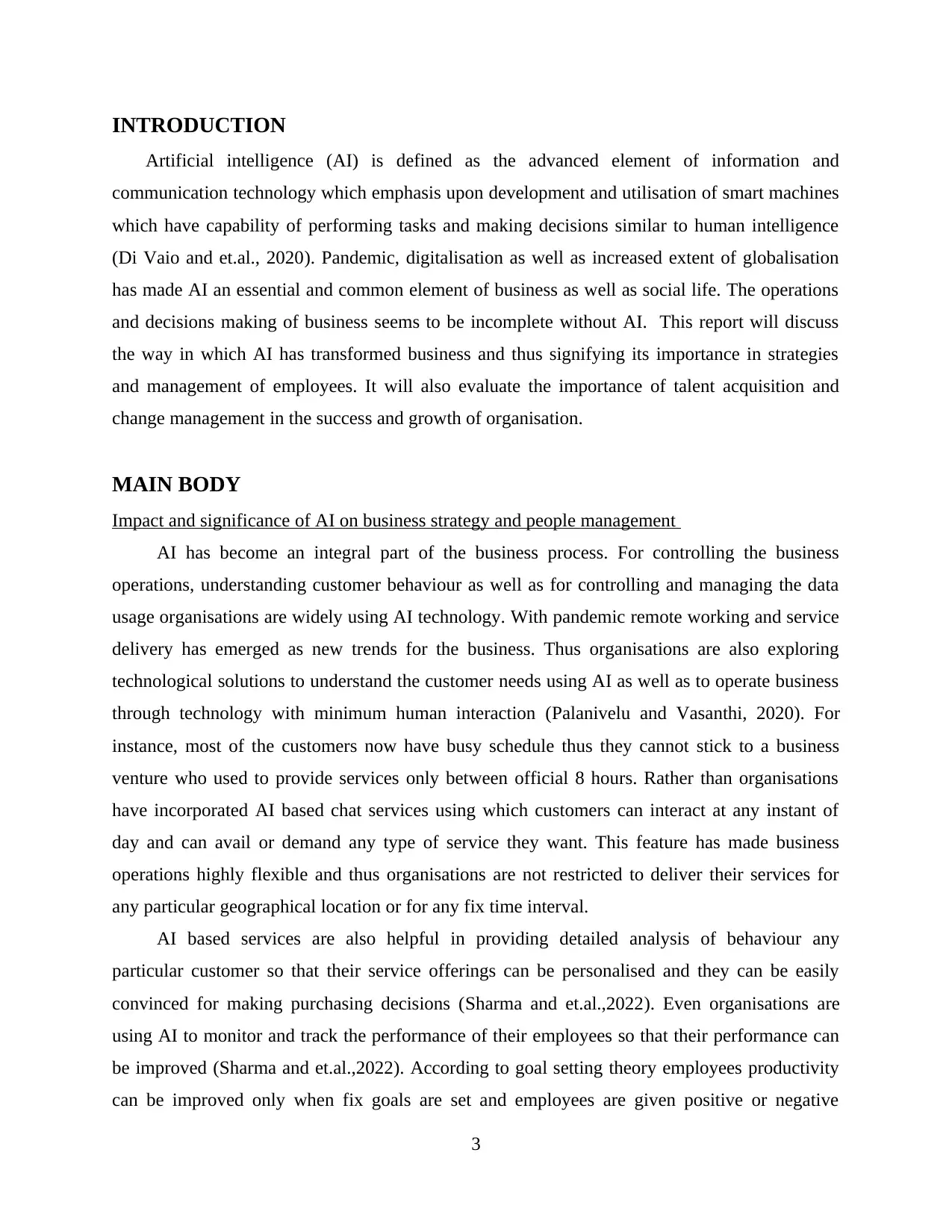
INTRODUCTION
Artificial intelligence (AI) is defined as the advanced element of information and
communication technology which emphasis upon development and utilisation of smart machines
which have capability of performing tasks and making decisions similar to human intelligence
(Di Vaio and et.al., 2020). Pandemic, digitalisation as well as increased extent of globalisation
has made AI an essential and common element of business as well as social life. The operations
and decisions making of business seems to be incomplete without AI. This report will discuss
the way in which AI has transformed business and thus signifying its importance in strategies
and management of employees. It will also evaluate the importance of talent acquisition and
change management in the success and growth of organisation.
MAIN BODY
Impact and significance of AI on business strategy and people management
AI has become an integral part of the business process. For controlling the business
operations, understanding customer behaviour as well as for controlling and managing the data
usage organisations are widely using AI technology. With pandemic remote working and service
delivery has emerged as new trends for the business. Thus organisations are also exploring
technological solutions to understand the customer needs using AI as well as to operate business
through technology with minimum human interaction (Palanivelu and Vasanthi, 2020). For
instance, most of the customers now have busy schedule thus they cannot stick to a business
venture who used to provide services only between official 8 hours. Rather than organisations
have incorporated AI based chat services using which customers can interact at any instant of
day and can avail or demand any type of service they want. This feature has made business
operations highly flexible and thus organisations are not restricted to deliver their services for
any particular geographical location or for any fix time interval.
AI based services are also helpful in providing detailed analysis of behaviour any
particular customer so that their service offerings can be personalised and they can be easily
convinced for making purchasing decisions (Sharma and et.al.,2022). Even organisations are
using AI to monitor and track the performance of their employees so that their performance can
be improved (Sharma and et.al.,2022). According to goal setting theory employees productivity
can be improved only when fix goals are set and employees are given positive or negative
3
Artificial intelligence (AI) is defined as the advanced element of information and
communication technology which emphasis upon development and utilisation of smart machines
which have capability of performing tasks and making decisions similar to human intelligence
(Di Vaio and et.al., 2020). Pandemic, digitalisation as well as increased extent of globalisation
has made AI an essential and common element of business as well as social life. The operations
and decisions making of business seems to be incomplete without AI. This report will discuss
the way in which AI has transformed business and thus signifying its importance in strategies
and management of employees. It will also evaluate the importance of talent acquisition and
change management in the success and growth of organisation.
MAIN BODY
Impact and significance of AI on business strategy and people management
AI has become an integral part of the business process. For controlling the business
operations, understanding customer behaviour as well as for controlling and managing the data
usage organisations are widely using AI technology. With pandemic remote working and service
delivery has emerged as new trends for the business. Thus organisations are also exploring
technological solutions to understand the customer needs using AI as well as to operate business
through technology with minimum human interaction (Palanivelu and Vasanthi, 2020). For
instance, most of the customers now have busy schedule thus they cannot stick to a business
venture who used to provide services only between official 8 hours. Rather than organisations
have incorporated AI based chat services using which customers can interact at any instant of
day and can avail or demand any type of service they want. This feature has made business
operations highly flexible and thus organisations are not restricted to deliver their services for
any particular geographical location or for any fix time interval.
AI based services are also helpful in providing detailed analysis of behaviour any
particular customer so that their service offerings can be personalised and they can be easily
convinced for making purchasing decisions (Sharma and et.al.,2022). Even organisations are
using AI to monitor and track the performance of their employees so that their performance can
be improved (Sharma and et.al.,2022). According to goal setting theory employees productivity
can be improved only when fix goals are set and employees are given positive or negative
3
⊘ This is a preview!⊘
Do you want full access?
Subscribe today to unlock all pages.

Trusted by 1+ million students worldwide
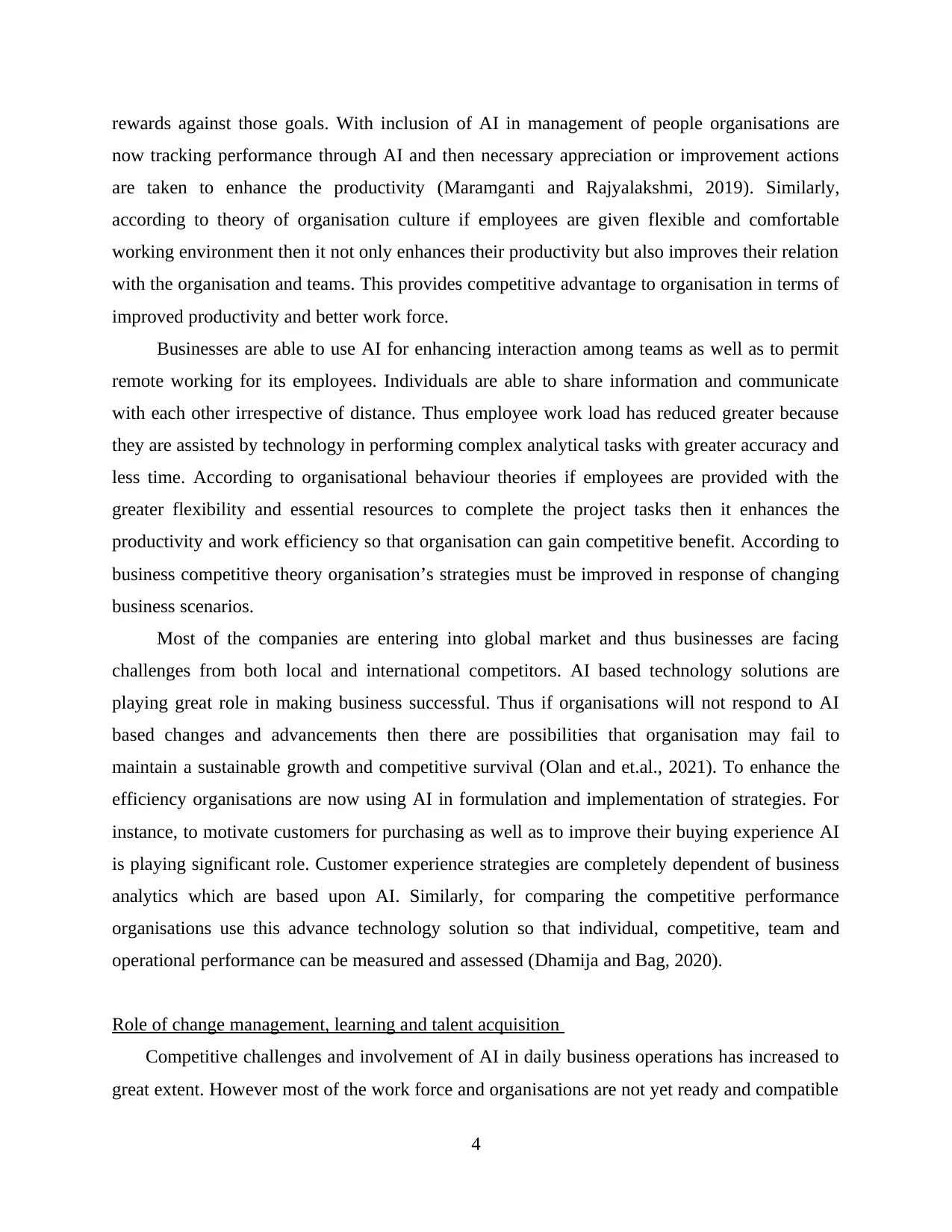
rewards against those goals. With inclusion of AI in management of people organisations are
now tracking performance through AI and then necessary appreciation or improvement actions
are taken to enhance the productivity (Maramganti and Rajyalakshmi, 2019). Similarly,
according to theory of organisation culture if employees are given flexible and comfortable
working environment then it not only enhances their productivity but also improves their relation
with the organisation and teams. This provides competitive advantage to organisation in terms of
improved productivity and better work force.
Businesses are able to use AI for enhancing interaction among teams as well as to permit
remote working for its employees. Individuals are able to share information and communicate
with each other irrespective of distance. Thus employee work load has reduced greater because
they are assisted by technology in performing complex analytical tasks with greater accuracy and
less time. According to organisational behaviour theories if employees are provided with the
greater flexibility and essential resources to complete the project tasks then it enhances the
productivity and work efficiency so that organisation can gain competitive benefit. According to
business competitive theory organisation’s strategies must be improved in response of changing
business scenarios.
Most of the companies are entering into global market and thus businesses are facing
challenges from both local and international competitors. AI based technology solutions are
playing great role in making business successful. Thus if organisations will not respond to AI
based changes and advancements then there are possibilities that organisation may fail to
maintain a sustainable growth and competitive survival (Olan and et.al., 2021). To enhance the
efficiency organisations are now using AI in formulation and implementation of strategies. For
instance, to motivate customers for purchasing as well as to improve their buying experience AI
is playing significant role. Customer experience strategies are completely dependent of business
analytics which are based upon AI. Similarly, for comparing the competitive performance
organisations use this advance technology solution so that individual, competitive, team and
operational performance can be measured and assessed (Dhamija and Bag, 2020).
Role of change management, learning and talent acquisition
Competitive challenges and involvement of AI in daily business operations has increased to
great extent. However most of the work force and organisations are not yet ready and compatible
4
now tracking performance through AI and then necessary appreciation or improvement actions
are taken to enhance the productivity (Maramganti and Rajyalakshmi, 2019). Similarly,
according to theory of organisation culture if employees are given flexible and comfortable
working environment then it not only enhances their productivity but also improves their relation
with the organisation and teams. This provides competitive advantage to organisation in terms of
improved productivity and better work force.
Businesses are able to use AI for enhancing interaction among teams as well as to permit
remote working for its employees. Individuals are able to share information and communicate
with each other irrespective of distance. Thus employee work load has reduced greater because
they are assisted by technology in performing complex analytical tasks with greater accuracy and
less time. According to organisational behaviour theories if employees are provided with the
greater flexibility and essential resources to complete the project tasks then it enhances the
productivity and work efficiency so that organisation can gain competitive benefit. According to
business competitive theory organisation’s strategies must be improved in response of changing
business scenarios.
Most of the companies are entering into global market and thus businesses are facing
challenges from both local and international competitors. AI based technology solutions are
playing great role in making business successful. Thus if organisations will not respond to AI
based changes and advancements then there are possibilities that organisation may fail to
maintain a sustainable growth and competitive survival (Olan and et.al., 2021). To enhance the
efficiency organisations are now using AI in formulation and implementation of strategies. For
instance, to motivate customers for purchasing as well as to improve their buying experience AI
is playing significant role. Customer experience strategies are completely dependent of business
analytics which are based upon AI. Similarly, for comparing the competitive performance
organisations use this advance technology solution so that individual, competitive, team and
operational performance can be measured and assessed (Dhamija and Bag, 2020).
Role of change management, learning and talent acquisition
Competitive challenges and involvement of AI in daily business operations has increased to
great extent. However most of the work force and organisations are not yet ready and compatible
4
Paraphrase This Document
Need a fresh take? Get an instant paraphrase of this document with our AI Paraphraser
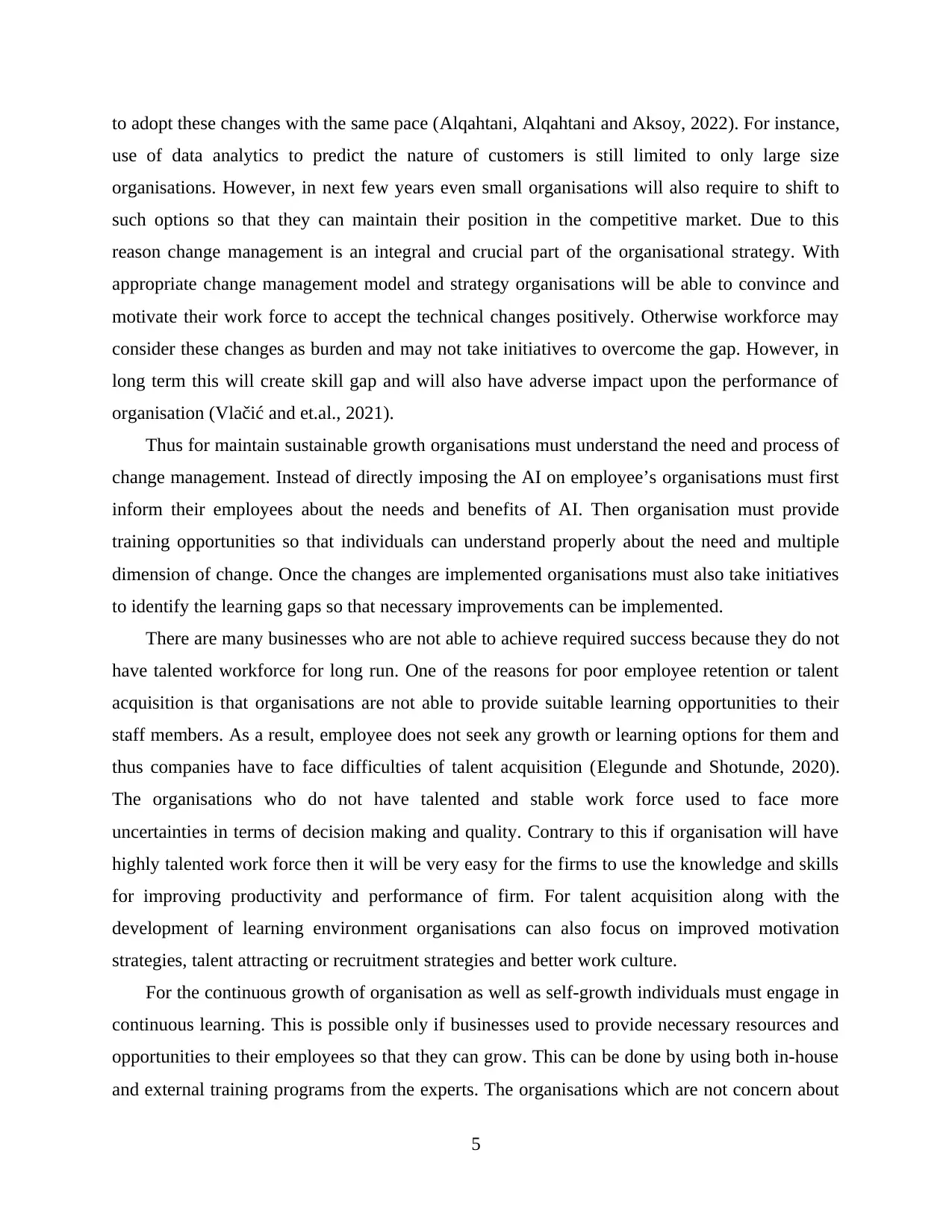
to adopt these changes with the same pace (Alqahtani, Alqahtani and Aksoy, 2022). For instance,
use of data analytics to predict the nature of customers is still limited to only large size
organisations. However, in next few years even small organisations will also require to shift to
such options so that they can maintain their position in the competitive market. Due to this
reason change management is an integral and crucial part of the organisational strategy. With
appropriate change management model and strategy organisations will be able to convince and
motivate their work force to accept the technical changes positively. Otherwise workforce may
consider these changes as burden and may not take initiatives to overcome the gap. However, in
long term this will create skill gap and will also have adverse impact upon the performance of
organisation (Vlačić and et.al., 2021).
Thus for maintain sustainable growth organisations must understand the need and process of
change management. Instead of directly imposing the AI on employee’s organisations must first
inform their employees about the needs and benefits of AI. Then organisation must provide
training opportunities so that individuals can understand properly about the need and multiple
dimension of change. Once the changes are implemented organisations must also take initiatives
to identify the learning gaps so that necessary improvements can be implemented.
There are many businesses who are not able to achieve required success because they do not
have talented workforce for long run. One of the reasons for poor employee retention or talent
acquisition is that organisations are not able to provide suitable learning opportunities to their
staff members. As a result, employee does not seek any growth or learning options for them and
thus companies have to face difficulties of talent acquisition (Elegunde and Shotunde, 2020).
The organisations who do not have talented and stable work force used to face more
uncertainties in terms of decision making and quality. Contrary to this if organisation will have
highly talented work force then it will be very easy for the firms to use the knowledge and skills
for improving productivity and performance of firm. For talent acquisition along with the
development of learning environment organisations can also focus on improved motivation
strategies, talent attracting or recruitment strategies and better work culture.
For the continuous growth of organisation as well as self-growth individuals must engage in
continuous learning. This is possible only if businesses used to provide necessary resources and
opportunities to their employees so that they can grow. This can be done by using both in-house
and external training programs from the experts. The organisations which are not concern about
5
use of data analytics to predict the nature of customers is still limited to only large size
organisations. However, in next few years even small organisations will also require to shift to
such options so that they can maintain their position in the competitive market. Due to this
reason change management is an integral and crucial part of the organisational strategy. With
appropriate change management model and strategy organisations will be able to convince and
motivate their work force to accept the technical changes positively. Otherwise workforce may
consider these changes as burden and may not take initiatives to overcome the gap. However, in
long term this will create skill gap and will also have adverse impact upon the performance of
organisation (Vlačić and et.al., 2021).
Thus for maintain sustainable growth organisations must understand the need and process of
change management. Instead of directly imposing the AI on employee’s organisations must first
inform their employees about the needs and benefits of AI. Then organisation must provide
training opportunities so that individuals can understand properly about the need and multiple
dimension of change. Once the changes are implemented organisations must also take initiatives
to identify the learning gaps so that necessary improvements can be implemented.
There are many businesses who are not able to achieve required success because they do not
have talented workforce for long run. One of the reasons for poor employee retention or talent
acquisition is that organisations are not able to provide suitable learning opportunities to their
staff members. As a result, employee does not seek any growth or learning options for them and
thus companies have to face difficulties of talent acquisition (Elegunde and Shotunde, 2020).
The organisations who do not have talented and stable work force used to face more
uncertainties in terms of decision making and quality. Contrary to this if organisation will have
highly talented work force then it will be very easy for the firms to use the knowledge and skills
for improving productivity and performance of firm. For talent acquisition along with the
development of learning environment organisations can also focus on improved motivation
strategies, talent attracting or recruitment strategies and better work culture.
For the continuous growth of organisation as well as self-growth individuals must engage in
continuous learning. This is possible only if businesses used to provide necessary resources and
opportunities to their employees so that they can grow. This can be done by using both in-house
and external training programs from the experts. The organisations which are not concern about
5
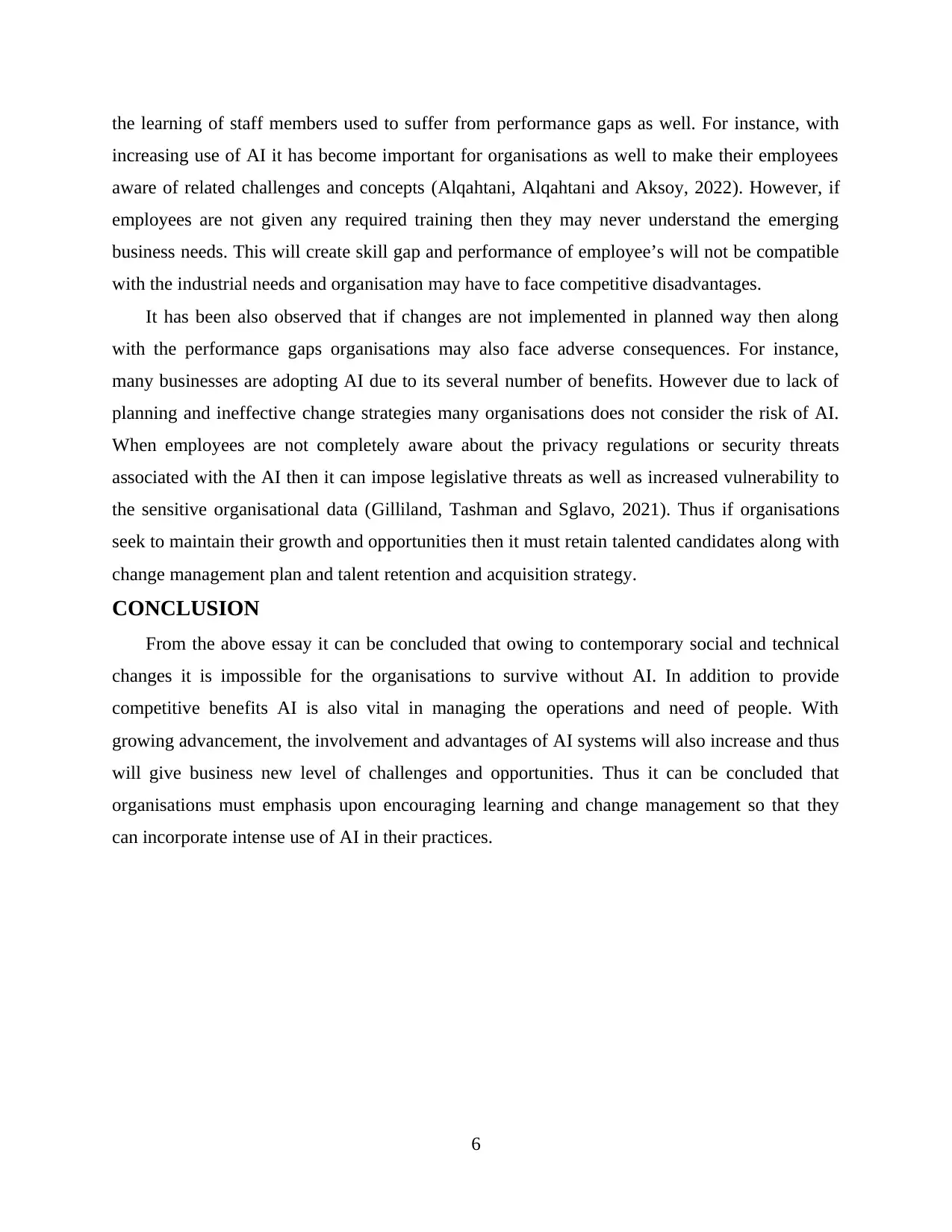
the learning of staff members used to suffer from performance gaps as well. For instance, with
increasing use of AI it has become important for organisations as well to make their employees
aware of related challenges and concepts (Alqahtani, Alqahtani and Aksoy, 2022). However, if
employees are not given any required training then they may never understand the emerging
business needs. This will create skill gap and performance of employee’s will not be compatible
with the industrial needs and organisation may have to face competitive disadvantages.
It has been also observed that if changes are not implemented in planned way then along
with the performance gaps organisations may also face adverse consequences. For instance,
many businesses are adopting AI due to its several number of benefits. However due to lack of
planning and ineffective change strategies many organisations does not consider the risk of AI.
When employees are not completely aware about the privacy regulations or security threats
associated with the AI then it can impose legislative threats as well as increased vulnerability to
the sensitive organisational data (Gilliland, Tashman and Sglavo, 2021). Thus if organisations
seek to maintain their growth and opportunities then it must retain talented candidates along with
change management plan and talent retention and acquisition strategy.
CONCLUSION
From the above essay it can be concluded that owing to contemporary social and technical
changes it is impossible for the organisations to survive without AI. In addition to provide
competitive benefits AI is also vital in managing the operations and need of people. With
growing advancement, the involvement and advantages of AI systems will also increase and thus
will give business new level of challenges and opportunities. Thus it can be concluded that
organisations must emphasis upon encouraging learning and change management so that they
can incorporate intense use of AI in their practices.
6
increasing use of AI it has become important for organisations as well to make their employees
aware of related challenges and concepts (Alqahtani, Alqahtani and Aksoy, 2022). However, if
employees are not given any required training then they may never understand the emerging
business needs. This will create skill gap and performance of employee’s will not be compatible
with the industrial needs and organisation may have to face competitive disadvantages.
It has been also observed that if changes are not implemented in planned way then along
with the performance gaps organisations may also face adverse consequences. For instance,
many businesses are adopting AI due to its several number of benefits. However due to lack of
planning and ineffective change strategies many organisations does not consider the risk of AI.
When employees are not completely aware about the privacy regulations or security threats
associated with the AI then it can impose legislative threats as well as increased vulnerability to
the sensitive organisational data (Gilliland, Tashman and Sglavo, 2021). Thus if organisations
seek to maintain their growth and opportunities then it must retain talented candidates along with
change management plan and talent retention and acquisition strategy.
CONCLUSION
From the above essay it can be concluded that owing to contemporary social and technical
changes it is impossible for the organisations to survive without AI. In addition to provide
competitive benefits AI is also vital in managing the operations and need of people. With
growing advancement, the involvement and advantages of AI systems will also increase and thus
will give business new level of challenges and opportunities. Thus it can be concluded that
organisations must emphasis upon encouraging learning and change management so that they
can incorporate intense use of AI in their practices.
6
⊘ This is a preview!⊘
Do you want full access?
Subscribe today to unlock all pages.

Trusted by 1+ million students worldwide
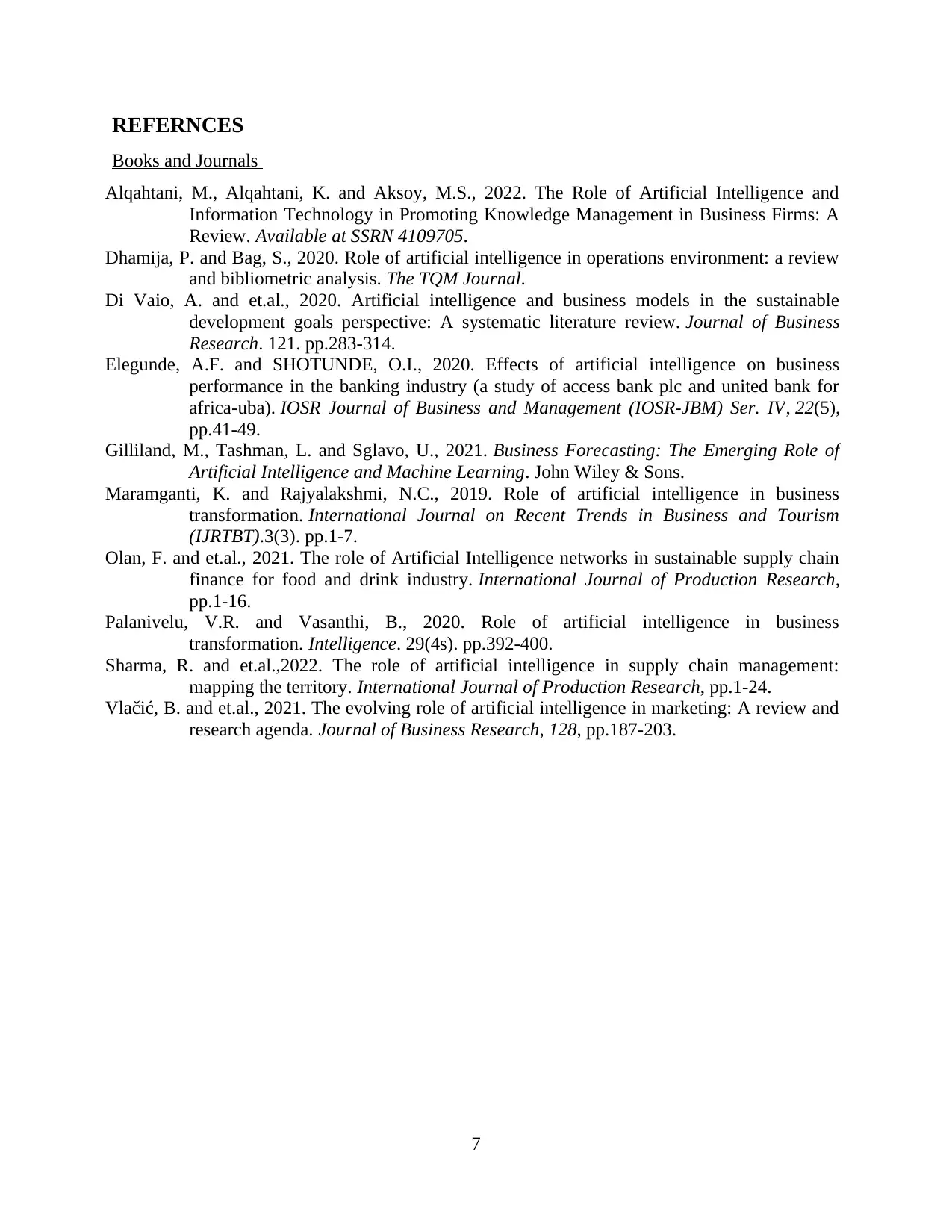
REFERNCES
Books and Journals
Alqahtani, M., Alqahtani, K. and Aksoy, M.S., 2022. The Role of Artificial Intelligence and
Information Technology in Promoting Knowledge Management in Business Firms: A
Review. Available at SSRN 4109705.
Dhamija, P. and Bag, S., 2020. Role of artificial intelligence in operations environment: a review
and bibliometric analysis. The TQM Journal.
Di Vaio, A. and et.al., 2020. Artificial intelligence and business models in the sustainable
development goals perspective: A systematic literature review. Journal of Business
Research. 121. pp.283-314.
Elegunde, A.F. and SHOTUNDE, O.I., 2020. Effects of artificial intelligence on business
performance in the banking industry (a study of access bank plc and united bank for
africa-uba). IOSR Journal of Business and Management (IOSR-JBM) Ser. IV, 22(5),
pp.41-49.
Gilliland, M., Tashman, L. and Sglavo, U., 2021. Business Forecasting: The Emerging Role of
Artificial Intelligence and Machine Learning. John Wiley & Sons.
Maramganti, K. and Rajyalakshmi, N.C., 2019. Role of artificial intelligence in business
transformation. International Journal on Recent Trends in Business and Tourism
(IJRTBT).3(3). pp.1-7.
Olan, F. and et.al., 2021. The role of Artificial Intelligence networks in sustainable supply chain
finance for food and drink industry. International Journal of Production Research,
pp.1-16.
Palanivelu, V.R. and Vasanthi, B., 2020. Role of artificial intelligence in business
transformation. Intelligence. 29(4s). pp.392-400.
Sharma, R. and et.al.,2022. The role of artificial intelligence in supply chain management:
mapping the territory. International Journal of Production Research, pp.1-24.
Vlačić, B. and et.al., 2021. The evolving role of artificial intelligence in marketing: A review and
research agenda. Journal of Business Research, 128, pp.187-203.
7
Books and Journals
Alqahtani, M., Alqahtani, K. and Aksoy, M.S., 2022. The Role of Artificial Intelligence and
Information Technology in Promoting Knowledge Management in Business Firms: A
Review. Available at SSRN 4109705.
Dhamija, P. and Bag, S., 2020. Role of artificial intelligence in operations environment: a review
and bibliometric analysis. The TQM Journal.
Di Vaio, A. and et.al., 2020. Artificial intelligence and business models in the sustainable
development goals perspective: A systematic literature review. Journal of Business
Research. 121. pp.283-314.
Elegunde, A.F. and SHOTUNDE, O.I., 2020. Effects of artificial intelligence on business
performance in the banking industry (a study of access bank plc and united bank for
africa-uba). IOSR Journal of Business and Management (IOSR-JBM) Ser. IV, 22(5),
pp.41-49.
Gilliland, M., Tashman, L. and Sglavo, U., 2021. Business Forecasting: The Emerging Role of
Artificial Intelligence and Machine Learning. John Wiley & Sons.
Maramganti, K. and Rajyalakshmi, N.C., 2019. Role of artificial intelligence in business
transformation. International Journal on Recent Trends in Business and Tourism
(IJRTBT).3(3). pp.1-7.
Olan, F. and et.al., 2021. The role of Artificial Intelligence networks in sustainable supply chain
finance for food and drink industry. International Journal of Production Research,
pp.1-16.
Palanivelu, V.R. and Vasanthi, B., 2020. Role of artificial intelligence in business
transformation. Intelligence. 29(4s). pp.392-400.
Sharma, R. and et.al.,2022. The role of artificial intelligence in supply chain management:
mapping the territory. International Journal of Production Research, pp.1-24.
Vlačić, B. and et.al., 2021. The evolving role of artificial intelligence in marketing: A review and
research agenda. Journal of Business Research, 128, pp.187-203.
7
1 out of 7
Related Documents
Your All-in-One AI-Powered Toolkit for Academic Success.
+13062052269
info@desklib.com
Available 24*7 on WhatsApp / Email
![[object Object]](/_next/static/media/star-bottom.7253800d.svg)
Unlock your academic potential
Copyright © 2020–2025 A2Z Services. All Rights Reserved. Developed and managed by ZUCOL.



